Common good

At Sojourners, people are just getting back from their holiday breaks with their families and some will still be out this week. D.C. public schools don’t even start until next week for my two boys.
Of course, members of the Senate and the House of Representatives came back early to avoid sending the nation off of the “fiscal cliff.” For the first time in two decades, taxes were increased for the wealthiest two percent, something most Americans support. And programs the Circle of Protection seeks to protect for the most vulnerable, including important tax credits that have kept millions of Americans out of poverty, were kept safe in the final deal.
The legislators barely succeeded in coming to a compromise but largely avoided the more challenging issues of the automatic spending cuts known as “sequestration” and an agreement on long-term deficit reduction. The compromise delayed the sequester for two months, which means it will kick in around the same time as an anticipated debt ceiling fight in which Republicans say they will force the nation into default unless they get the spending cuts they want.
As reflected in this deal, I applaud the President's continued commitment to protect poor and vulnerable people. I encourage him to remain steadfast in his refusal to negotiate. However, it remains to be seen whether the President will continue on in his refusal to negotiate on such important matters with those risking our nation’s economic health to advance their own political ideology.
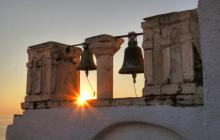
Our text this morning, brothers and sisters, is from the inimitable Scottish devout Robert Louis Stevenson, writing (ostensibly) about his native city:
“Indeed, there are not many uproars in this world more dismal than that of the Sabbath bells in Edinburgh: a harsh ecclesial tocsin; the outcry of incongruous orthodoxies, calling on every separate conventicler to put up a protest, each in his own synagogue, against ‘right-hand extremes and left-hand defections.’ And surely there are few worse extremes than this extremity of zeal; and few more deplorable defections than this disloyalty to Christian love. Shakespeare wrote a comedy of ‘Much Ado About Nothing.’ The Scottish nation made a fantastic tragedy on the same subject. And it is for the success of this remarkable piece that these bells are sounded every Sabbath morning on the hills above the Forth. How many of them might rest silent in the steeple, how many of those ugly churches might be demolished and turned once more into useful building materials, if people who think almost exactly the same thoughts about religion would condescend to worship God under the same roof! But there are the chalk lines. And which to pocket pride, and speak the foremost word?”
Which, indeed?
Let us talk for a minute, blunt and honest and not polite for a change, about that which is never said and ought to be: that the divisions and disagreements among the Christian sects and traditions are silly and selfish.

WANT TO PUT money to work for the common good? Your congregation—large or small—has more to invest than you might expect. Here are three questions to get you started.
1. Where does our church bank? "Many churches choose a bank based on proximity to the church or the church treasurer's home," Andy Loving says, but it doesn't have to end there. Approach the finance committee and say, "We want to put our money somewhere that has implications for what we value as a church," suggests Loving. Find a bank that empowers economically depressed areas through brick-and-mortar locations and socially responsible loan practices.
2. Does the bank we're considering provide options for the poor? Where are the branches located? Does it loan to people or businesses who typically don't get approved by mainstream lenders? One institution Loving recommends is Self-Help Credit Union in Durham, N.C., which has locations throughout the state—and also a web-based interface convenient for members outside the area. Another place to hunt for justice-oriented banking is the National Community Investment Fund website, www.ncif.org, which allows you to search by location and banking practices.

Our country just hit a tipping point. Leading up to the election, contentious posts filled our Facebook feeds, and bickering pundits caused more stress than is healthy. We split ourselves down the middle. But in the aftermath of the election, out of the rubble, a new consensus is forming—that we need to come together to solve the nation’s most pressing and impending problems.
We believe what we need right now is to come together and have a robust discussion about the “Common Good.” It’s an old concept that’s being reinvented by a new generation. From caring for our neighbors, whether next door and across the glove, it’s also the theme of Jim Wallis’ newest book, On God's Side, set to release from Brazos Press in early February of 2012.
Jim’s book is the beginning of the conversation, but he can’t have it by himself. An essential part of the common good is a multi-faceted, community-driven exploration of what that really means.
This is where you come in.
We’re looking for one- to three-minute submitted videos that examine what the common good means to you. We’ll send you an advance copy of Jim’s book for inspiration, and you take it from there.
The best part? We’ll pay you $1,000.
Afterwards, we’ll promote your video on all our platforms. You can expect nationwide publicity, and a huge bump in your viewership. Your portfolio will thank you.
Here’s the process:
Start applying today, November 16th. The application is HERE. It’s pretty straightforward. Submission deadline is December 10th, and we’ll let you know by the 12th if you’re 1 of 3 finalists. You send us a rough cut by January 16th, and a final cut on January 30th. January 30th comes, we get a final cut, and you get $1,000.
Want in?

The day after the 2012 election brought a great feeling of relief. Most of us, whether our candidates won or lost, were so weary of what elections have become that we were just glad the process was over. Many were disappointed that dysfunctional and bitterly partisan politics in Washington, D.C., had undermined their deep desires for “hope” and “change.” Politics has severely constrained those possibilities by focusing on blame instead of solutions, and winning instead of governing. And, as the most expensive election in American history just showed, the checks have replaced all the balances.
But the election results produced neither the salvation nor the damnation of the country, as some of the pundits on both sides seemed to suggest.
The results of the presidential election showed how dramatically a very diverse America is changing; people are longing for a vision of the common good that includes everyone. As one commentator put it “the demographic time bomb” has now been set off in American politics — and getting mostly white, male, and older voters is no longer enough to win elections, as the Romney campaign learned on Tuesday.
I’VE ALWAYS LOOKED forward to Advent. It’s a time each year of expectant hope—the hope brought by the coming of a child, born in an animal stall in Bethlehem, who would change everything. It is the time of year when I am reminded again of the choice we always have between cynicism and hope. That’s ultimately a spiritual choice, and Advent is a formative season that nurtures the choice to hope, which can guide our decisions and actions.
This fall, Sojourners launched a new project called Emerging Voices, and it’s one of the most hopeful initiatives I have been involved with in a long time. It aims to mentor, develop, and promote the most dynamic up-and-coming communicators—speakers, preachers, and teachers—who are called to lead and publicly articulate the biblical call to social justice.
The vision for this project is exciting and something to be celebrated. It also calls to mind a critical observation: Our world often wants saviors, not prophets; new messiahs, not leaders. We want heroes with superhuman strength who save the day, not mere mortals who speak the truths we typically don’t want to hear. Even the modern-day giants of social justice—Dr. Martin Luther King Jr., Dorothy Day, and Mahatma Gandhi, for example—were at best prophets, but never saviors.
It’s easy to slip into the mentality that one person, one voice, will rise up in a generation, and that she or he will change the world as we know it. Dr. King spoke of this temptation as the “drum major instinct.” It is the basic desire of humans to lead the charge and, ultimately, reap the recognition—or, at the very least, to place our confidence in a single human being.

The apostle Paul calls the church in Corinth a body — and that’s political language: “God has arranged the parts in the body, every one of them, just as he wanted them to be … As it is, there are many parts, but one body” (1 Cor. 12:18-20).
As Dale Martin argues in his book The Corinthian Body, Paul gets his language about the social body, the political body, from other Greco-Roman speeches and letters. He uses a style of writing and speaking called a “concord” — homonoia in Greek. Politicians would give speeches or write letters trying to convince the diverse people of the city to unite in a common project, to share the same goals for society, to share a common politics. In these “concord” addresses, politicians would call the society a body, just like Paul does in his letter to the divided church in Corinth. We are one body, politicians would say, so we need to act accordingly. We are one — united, bound together. Of course, politicians only made these speeches when they needed to: that is, when dissatisfied segments of society wanted to revolt (see Martin, Corinthian Body, 38-47).
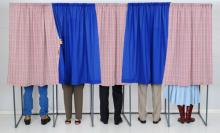
In a few weeks citizens will choose who serves as president of the United States. As many from all sides of the political spectrum have already recognized, the nationwide decision of Nov. 6 will affect the direction of 50 states – as well as the international community – for generations to come.
Since the opposing candidates offer contrasting views for the future, the choice is indeed critical, thus all are encouraged to listen openly and attentively, critique the various policy positions carefully, and when the first Tuesday of November arrives, make an informed choice for the collective benefit of our global common good.
While one should affirm and appreciate the importance of Election Day, we should also recognize and appreciate our ability to shape society far more frequently than once every four years. While several years pass between presidential elections, we vote for the collective benefit of our global common good on numerous occasions with each passing day.
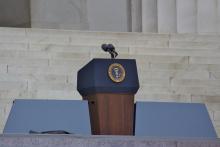
[editor's note: This article was originally published in 2012. References to elections or politicians without specific dates attached are in the context of the 2012 election cycle.]
AS I CAREFULLY watched both the Democratic and the Republican conventions this summer, I realized, once again, how challenging and complicated it is to bring faith to politics.
For example, the phrase “middle class” was likely the most repeated phrase at the conventions. And even though both parties are utterly dependent on their wealthy donors (a fact they don’t like to talk about), they know that middle-class voters will determine the outcome of the election. Now, I believe a strong middle class is good for the country, but Jesus didn’t say, “What you have done for the middle class, you have done for me.” Rather, Matthew 25 says, “What you have done to the least of these, you have done to me.”
When your first principle for politics is what happens to the poor and vulnerable—and I believe that is the first principle for Christians—you keep waiting at conventions for those words and commitments. There were a few moments when the poor were briefly mentioned, but it certainly wasn’t a strong theme in Tampa or Charlotte. “Opportunity” for the middle class was an important word in both conventions this year, but Christians must be clear that creating new opportunities for poor children and low-income families is critical to us.
The conventions also talked a great deal about “success,” but how we define that is very important. Is success mostly about how much money we make, defining the “American Dream” as being able to pass on more riches to our children than what our parents passed on to us? Or is success measured by how we as a nation prioritize, in our spending and political choices, the sick, the vulnerable, the weak, and the elderly? Is it determined more by the values we pass on to our children—evaluating our lives, and theirs, by how much we are able to help others?
America is a nation of immigrants, and how we welcome “the stranger” in our midst is another Christian principle for politics. So is our racial diversity as a nation, where all our citizens must be treated as having equal value. The most inspiring stories at the conventions for me came when that diversity was evidenced on the stage—from a young undocumented “dreamer” and a black first lady on the platform at the Democratic convention to Condoleezza Rice telling her fellow Republicans how a little girl from a segregated Southern city became secretary of state. But little mention was made at either convention of the racial disparities in America’s burgeoning prison industry or voting suppression efforts that most affect minorities and people who are poor.

According to Article 19 of the Universal Declaration of Human Rights, “Everyone has the right to freedom of opinion and expression; this right includes freedom to hold opinions without interference and to seek, receive and impart information and ideas through any media and regardless of frontiers.”
Similarly, the First Amendment to the United States Constitution declares “Congress shall make no law…prohibiting the free exercise of; or abridging the freedom of speech…”
While certain opponents exist, most of us agree that free speech is an essential ingredient for a mature democracy, thus it should be encouraged, protected, and further developed. With these thoughts in mind, while we should indeed celebrate the numerous positive outcomes of free speech in the USA, we should also account for its costs, for even the most worthy of causes – such as free speech – bring an assortment of unintended negative consequences.
As our November Election Day draws closer, we are mindful that a defense of free speech has led to millions of dollars directed toward ads, phone calls, literature distribution, and other activities that seek to sway the electorate. As countless studies have shown, the totality of these campaign strategies holds a significant impact on voter decisions and overall turnout.
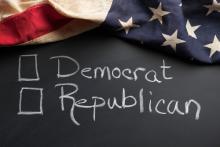
With the Republican and Democratic National Conventions having taken place over the last two weeks, we can officially say that we’re entering the election season (i.e., that time when the general public begins to pay attention).
A couple of friends who pastor churches in non-D.C. parts of the country asked me if we feel the need to address politics at The District Church, being in the very belly of the beast (my words, not theirs). Specifically, they were asking: Given the intense polarization and often-unproductive arguing that we see around us, even in the church, about the need to address how we interact with those who disagree with us.
So far, we haven’t needed to. In our church community, we have Republicans, Democrats, Independents, and yes, even people who don’t care about politics; we have Hill staffers, White House staffers, activists, advocates, lobbyists, policy wonks, and more — and we’ve all come together as the body of Christ, recognizing that our allegiance is first to Jesus before any party or even country.
Even so, every four years (or every two, if you pay attention to mid-terms; or all the time, if you’re even more politically engaged), posts about politics pop up with increasing frequency on social media, eliciting often-furious back-and-forths that usually end up doing nothing more than reminding each side how right they are and how stupid the other side is.
So I figured I’d try to offer a few suggestions on how we can engage with one another on matters of politics in healthy ways.
A few weeks after the October 2002 plane crash that killed Sen. Paul Wellstone, his wife, Sheila, their daughter, Marcia, and five others, a Lutheran confirmation class visiting D.C. from Minnesota decided to stop by Wellstone’s office to pay their respects. As the group went through security at the Senate office building, one of the students—who had worked on the senator’s re-election campaign and was still wearing a Wellstone button—set off the metal detector. The officer took her to the side to wand her. As he was checking her, the guard said, “Not one other senator in this place knows my name; Paul Wellstone knew my kid’s name.” He and the student hugged each other, and both started weeping.
Paul Wellstone touched people’s lives in profound ways, mostly because he genuinely sought to live a life of integrity, in both public and personal matters. He once advised, “Never separate the life you live from the words you speak,” and those who knew him best said he honestly tried to follow that advice. (A Midwest political observer said the Right never knew what to do with Wellstone, because he lived “conservative values” at home while working for progressive change in the public sphere.)
Wellstone’s political career began when, as a political science professor at Minnesota’s Carleton College, he started working with farmers to block electric lines forcibly run through their farms—and he continued to organize and agitate on behalf of regular people for the rest of his days.
Bob Hulteen, a longtime Minneapolis-based activist (and a former Sojourners editor), said that Wellstone respected people more deeply than “any politician, or church leader, I’ve ever met—and, maybe most important, he didn’t take himself too seriously.” But Wellstone never underestimated the seriousness of his work for a better world, which is why, a decade after his passing, we asked several people who have been touched by his life in various ways to offer their thoughts on the legacy of a man who continues to offer a model of inspiration, integrity, and hope—attributes that are profoundly needed, in this and any election season.
—The Editors
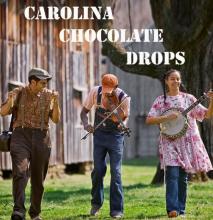
LATELY I’VE been on a campaign to read some of the classic novels that I should have read decades ago. This summer it’s been John Steinbeck’s The Grapes of Wrath. There, I confessed it. All these years I’ve been coasting on repeated viewings of the John Ford film adaptation. But I’m reading the original now. And despite the hunger and hardship faced by the Joad family, I find myself experiencing nostalgia for those old hard times.
Americans fell into the Great Depression of the 1930s without the safety net of unemployment insurance, food stamps, or federally insured bank deposits. In fact, victims of the current depression have those benefits because of the things their ancestors did 80 years ago. Back then, Americans pulled together with the sure belief that we are all responsible for each other and that no one of us can, or should, stand alone. They recognized that a common plight required common action, and they gave us a trade union movement and a New Deal.
In The Grapes of Wrath, that recognition is rooted in the primary value of family solidarity, which grows to include neighbors and co-workers, and, finally, in Tom Joad’s famous speech, extends to all people struggling for justice (“whenever they’s a fight so hungry people can eat”), and even to all humanity, past and present (“maybe all men got one big soul ever’body’s a part of”).

I have been a Little League baseball coach for both of my sons’ teams for many years. And I’ve learned that baseball can teach us life lessons.
Just a few weeks ago, my 9-year-old’s team was down 5-0, and we had already lost our first two games. It didn’t look good. But all of a sudden, our bats came alive; all our practice and preparation suddenly showed itself. Best of all, our rally started in the bottom half of the order, with our weakest hitters. Two kids got on with walks, and our least experienced player came to the plate. With international parents, he had never played baseball before, and you could tell he didn’t have a clue. But somehow he hit the ball, and it went into the outfield. Our first two runs scored, and he ended up on second base. Being from a British Commonwealth culture, he began to walk over to the shortstop and second baseman and shake their hands! “Stefan,” I shouted. “You have to stay on the base!” “Oh,” he said. “I’ve never been here before.”
Inspired, other kids who had never got hits before also got them now. Then the best hitters started to hit, and we came back to win 11 to 6. In a long team meeting afterward, the kids couldn’t stop telling each other what they had learned. “We didn’t give up, and we came back!” “Our rally started with the bottom of the order.” “Sometimes you get what you need from unexpected places.” “We all just kept cheering for each other.” “Everybody helped us win today.” Finally, our star player said, “This just goes to show you: You can’t ever give up on hope. We always have to keep on hoping no matter what.”
This is central to our vocation in the churches: to offer unexpected hope, because our mission is to the kingdom of God—“thy kingdom come, thy will be done, on earth as it is in heaven.” That is what we pray. And while the kingdom of God was the central message of Jesus and the New Testament, it has faded as ours. Finding salvation to heaven is part of the message, getting closer to God is part of the message, but the heart of the message of Jesus was a new order breaking into history—changing everything about the world, including us.
Politics is a true American idol, and the 2012 election will dramatically demonstrate that reality.
People of faith should never worship at the altar of politics, because we worship God; the kingdom of God is never the same as the kingdoms of politics. Our worship of God should shape our engagement with politics. When politics shapes our religion, it distorts our true worship.
Rather than becoming the chaplains or enablers of political idolatry, the faith community should confront it. The idols of politics are many: the idol of money over democracy, the idol of celebrity over leadership, the idol of individualism over community, the idol of ideology over civility, and the idol of winning over governing. Both sides take a problem and do two things: make us afraid of it, and then blame it on the other side. What they don’t do is work together to solve our problems, finding solutions for the common good.
What caused me to rethink these questions of faith and politics was my encounter earlier this year with a lion in a monastic community overlooking the Pacific Ocean at the beginning of my sabbatical. Entering into solitude and silence with monks, punctuated only by Vigils, Lauds, Eucharist, and Vespers, can alter a person’s perspective. In the monastery’s guest kitchen library, I spotted the Chronicles of Narnia, by C.S. Lewis, and decided to reread them. Aslan the lion is the creator and leader of Narnia, the true and good king, and the stories’ Christ figure. Because I was beginning to write a book about the common good, with Jesus as the inspiration for it, I was again drawn to Aslan.
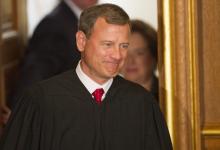
In 2009, during the debate over health care, I devoted a good deal of my time arguing in favor of President Obama’s efforts to provide some form of universal health care to the people of the United States. I argued that universal health care is a human right. I argued that providing a way for people to get medical care without the worry of going bankrupt or of having to be shackled to a job because they or someone in their family needs health care is a matter of establishing justice in our country. It is a matter of distributive justice.
In the Supreme Court decision upheld the Affordable Care Act (ACA a.k.a. Obamacare) Chief Justice John Glover Roberts, Jr., writing for the majority of the court, in effect said that the act is constitutional because Congress has the power of taxation. He quotes Benjamin Franklin: “Our Constitution is now established . . .but in this world nothing can be said to be certain, except death and taxes.”
Opponents of the ACA argued that the individual mandate that requires people to buy health insurance was unconstitutional. They argued that it was an overreach of governmental power to require someone to buy something. Supporters of the ACA argued that the individual mandate was constitutional under the powers granted to Congress under the commerce clause and because Congress has the power of taxation. The penalty imposed on people who do not buy health insurance will be collected by the IRS when a person files h/er income taxes. The penalty or tax only applies to people who can afford to buy health insurance but who choose to not buy it.
The chief justice’s opinion does not judge the morality of the law. Roberts does not speak of the Universal Declaration of Human Rights and the goals it sets for the entire human community, including universal health care. He does not speak of the concepts of liberty and justice for all, that the government has an obligation to its citizens to make health care something that is available to all.

Carolyn Winfrey Gillette wrote this hymn based on Micah 6:8 after attending Bread for the World’s Lobby Day on June 12th and reading Jim Wallis’ “The Missing Religious Principle in Our Budget Debates.”
O God, You Call for Justice
AURELIA 7.6.7.6 D ("The Church's One Foundation")
O God, you call for justice—for goodness, never greed!
You seek a world of fairness where all have what they need—
Where all have food and water and homes in which to thrive,
Where all have hope and laughter and joy to be alive!

Looking for a last-minute gift for Fathers Day or a graduate?
How about doing something for someone else in honor of your loved one?
Give a gift that helps the poorest of the poor feed their families, earn a living, protect themselves from disease or educate their children.
Inside the blog, find several suggestions of unique gifts that keep on giving.
NORTHAMPTON, Mass. – Poor memory? Hard to say. I'm just glad I don't remember details of my college road trips to Northampton and my .000 batting average with Smith College women.
That means I can approach stopping by this charming college town as a pleasant diversion with my wife after a family lunch in nearby Worcester. I can escape shadows of feeling lost among the hyper-sophisticated Smithies. Some history deserves to be forgotten.
Moreover, what merits remembering requires reflection and fresh engagement, not just a sense of cyclical dread.
The ugly political morass of 2012 isn't just Reaganism redux: It's not just another variation on the "trickle-down" delusion – make the rich rich enough and they will discover how to share – and the economic and political destruction that flowed from chasing that fantasy. Nor is it another dabbling in McCarthyism's politics of fear and scapegoating.
Writing for Religion News Service and featured in The Washington Post, Tom Ehrich has some strong words for the culture of fear and distortion he sees in politics:
When people make grandiose claims about “God’s will” and “American values” and demonize others who hold different views, we haven’t just channeled a tragic yesterday and its wars and pogroms. We have poisoned the well of community on which our nation depends today and made a mockery of God and faith.
Read his full article here.